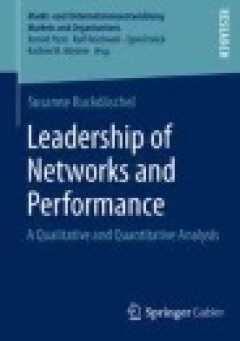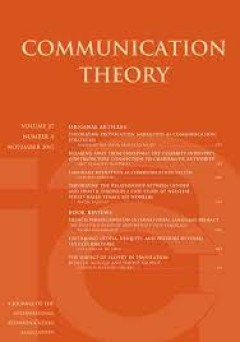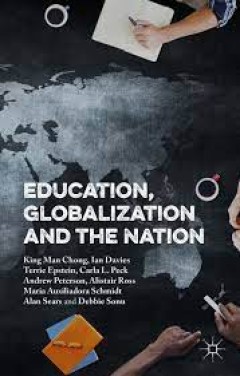Filter by

Educational Leadership Relationally
Educational leadership, management and administration has a rich history of epistemological and ontological dialogue and debate. However in recent times, at least since the publication of Colin Evers and Gabriele Lakomski’s trilogy – knowing, exploring and doing educational administration – there has been a distinct dearth. Educational Leadership Relationally explicitly returns matters of…
- Edition
- 1
- ISBN/ISSN
- 978-94-6209-911-1
- Collation
- -
- Series Title
- -
- Call Number
- XIV, 152

Educational Effectiveness and Ineffectiveness
This book is a critical assessment of the knowledge base on educational effectiveness, covering a period of five decades of research. It formulates a “lean” theory of good schooling, and identifies and explains instances of “ineffectiveness”, such as low effect sizes of malleable conditions, for which expectations are highly strung. The book presents a systemic outlook on educational ef…
- Edition
- 1
- ISBN/ISSN
- 978-94-017-7457-4
- Collation
- -
- Series Title
- -
- Call Number
- XV, 389

Educational Development in Western China
In 2000, the “Western Development” plan of the Chinese Mainland attracted attention of educators and policy makers. Around that period, the Chinese government also launched large scale and systemic curriculum reforms in basic education and secondary education in achieving quality education across the vast country. Despite significant progress that has been made in educational investments an…
- Edition
- 1
- ISBN/ISSN
- 978-94-6300-232-5
- Collation
- -
- Series Title
- -
- Call Number
- -

Leadership of Networks and Performance: A Qualitative and Quantitative Analysis
In contrast to hierarchical leadership within intra-organizational contexts, leaders of inter-organizational networks have to lead across organizational boundaries without hierarchical fiat or directive authority. The central research question of Susanne Ruckdäschel is how leadership behavior of network managers can influence network performance. Hereby, relational leadership in the form of em…
- Edition
- -
- ISBN/ISSN
- 978-3-658-07033-5
- Collation
- -
- Series Title
- -
- Call Number
- -

Educational Contexts and Borders through a Cultural Lens
This book provides a “context” of discussion for researchers and educational experts in order to rethink the relationship between actors, practices and borders within the educational contexts. The research in educational psychology has often challenged the concept of “educational context”. According to the different theoretical frameworks, the construct of contexts, their borders and th…
- Edition
- 1
- ISBN/ISSN
- 978-3-319-18764-8
- Collation
- -
- Series Title
- 7 b/w illustrations, 10 illustrations in colour
- Call Number
- XXI, 366

Leadership of Assessment, Inclusion, and Learning
This book provides pragmatic strategies and models for student assessment and ameliorates the heightened sense of confusion that too many educators and leaders experience around the complexities associated with assessment. In particular, it offers guidance to school and district personnel charged with fair and appropriate assessment of students who represent a wide variety of abilities and cult…
- Edition
- -
- ISBN/ISSN
- 978-3-319-23347-5
- Collation
- -
- Series Title
- -
- Call Number
- -

Communication Theory
This book is an introduction to communication theory — the theory of how humans share, encode, and decode what they know, what they need, and what they expect from each other
- Edition
- -
- ISBN/ISSN
- -
- Collation
- -
- Series Title
- -
- Call Number
- 302.2 OPE c

Education, Theory and Pedagogies of Change in a Global Landscape
Where does theory come from in educational research and how is it operationalized in diverse, interdisciplinary contexts and professional settings? This volume examines the places and spaces of theory in doctoral work across a wide range of interdisciplinary themes and fields of inquiry on a global scale.
- Edition
- 1
- ISBN/ISSN
- 978-1-349-55934-3
- Collation
- -
- Series Title
- -
- Call Number
- XV, 223

Leadership in Surgery
How does one become a successful leader? This book teaches the theories and concepts behind leadership and explains the skills and traits needed to become a good leader. Teaching surgical faculty and trainees (i.e., residents and fellows) how to successfully lead will create more effective surgeon leaders. The skills and theories reviewed in this Volume are highly useful for numerous leadersh…
- Edition
- -
- ISBN/ISSN
- 978-3-319-11107-0
- Collation
- -
- Series Title
- -
- Call Number
- -

Education, Globalization and the Nation
Globalization' and 'the Nation' provide significant contexts for examining past educational thinking and practice and to identify how education has been influenced today. This book, written collaboratively, explores country case studies - Australia, Brazil, Canada, China, the UK and USA as well as discussing the transnational European Union.
- Edition
- 1
- ISBN/ISSN
- 978-1-349-55932-9
- Collation
- -
- Series Title
- -
- Call Number
- X, 224
 Computer Science, Information & General Works
Computer Science, Information & General Works  Philosophy & Psychology
Philosophy & Psychology  Religion
Religion  Social Sciences
Social Sciences  Language
Language  Pure Science
Pure Science  Applied Sciences
Applied Sciences  Art & Recreation
Art & Recreation  Literature
Literature  History & Geography
History & Geography